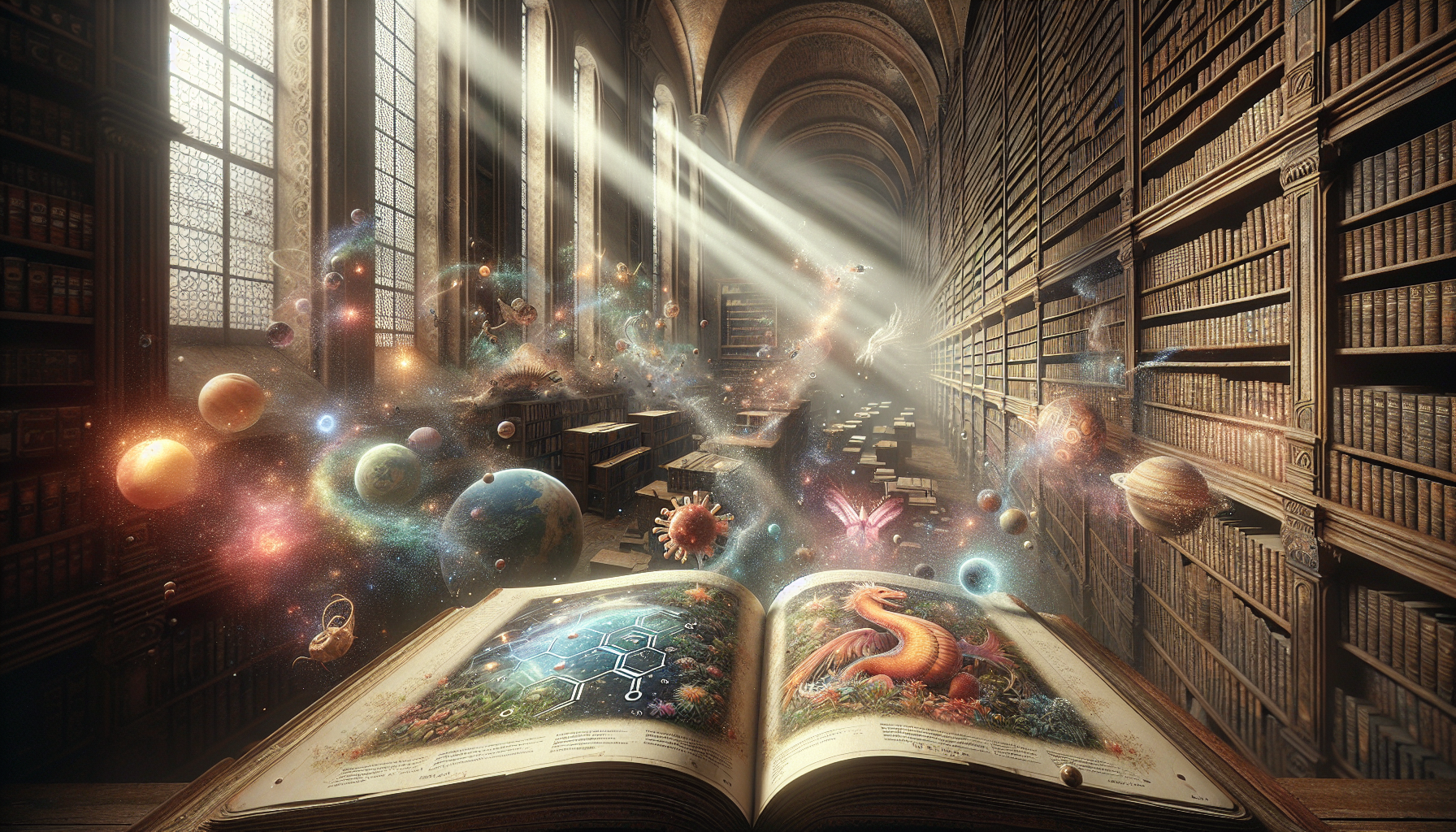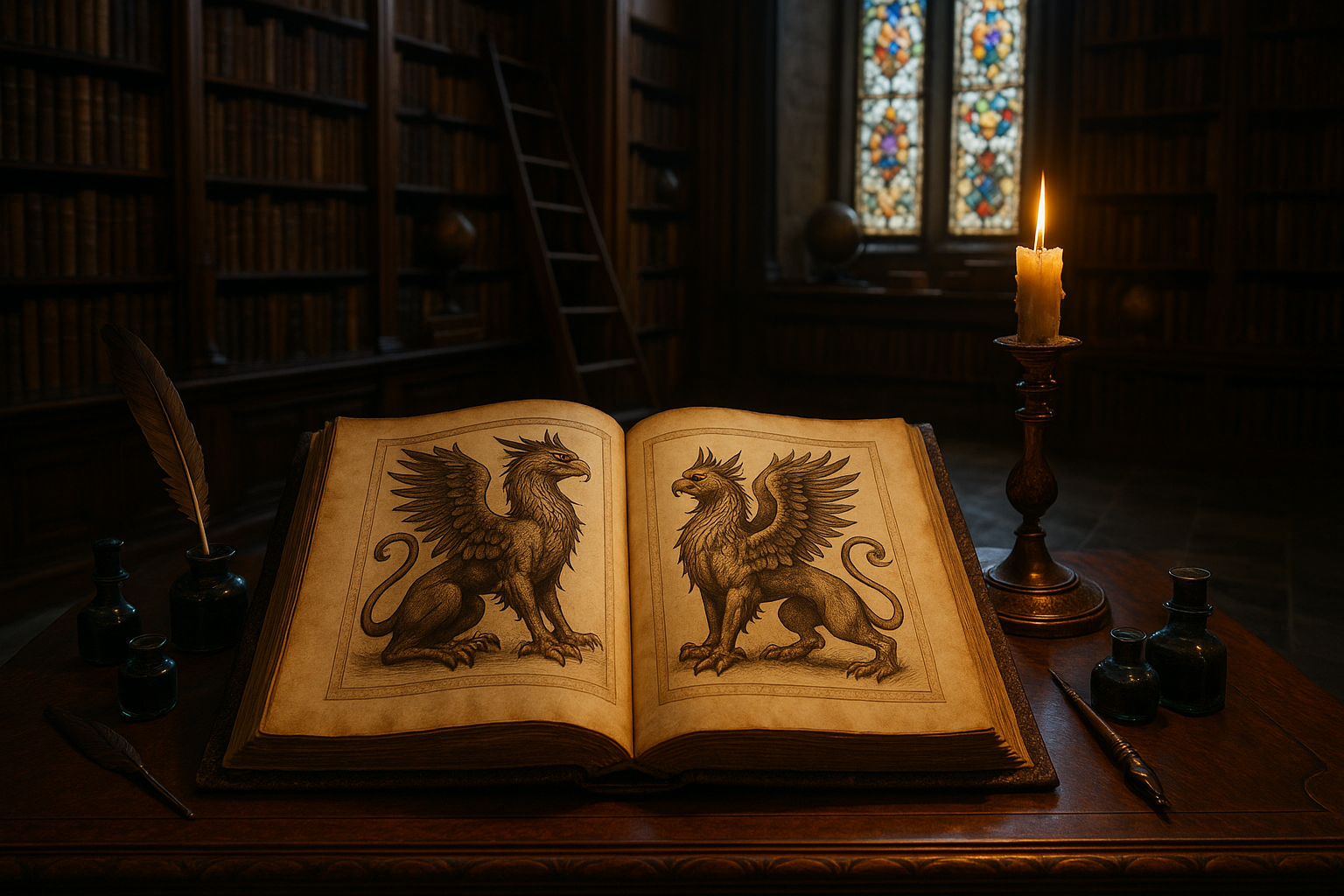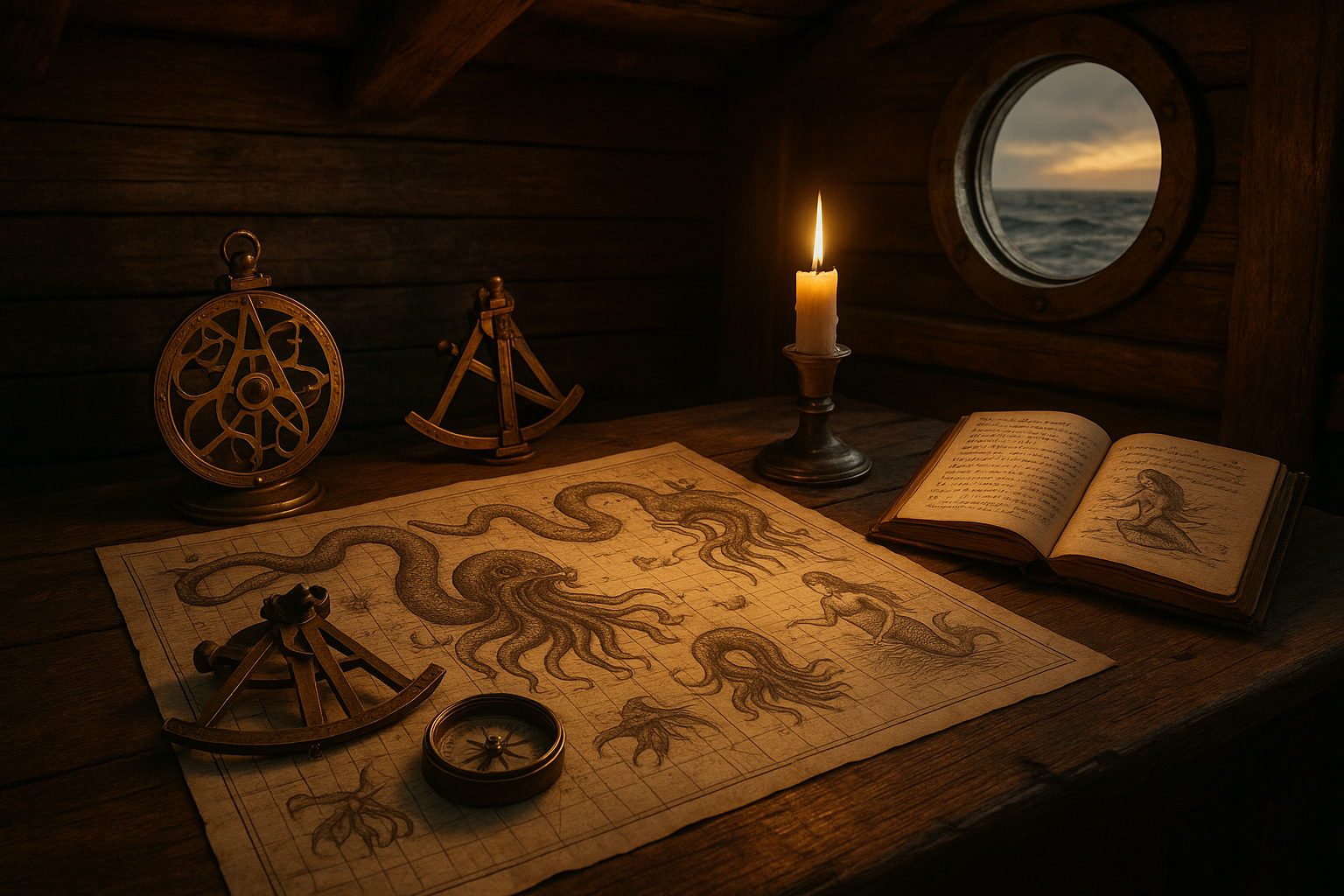In a world where the lines between myth and reality often blur, the concept of knowledge itself can sometimes feel like an enigma wrapped in a riddle. 🌌 How do we discern fact from fiction when history is peppered with tales of dragons, gods, and heroes alongside the hard data of scientific discovery? The answer, for many, lies within the pages of encyclopedias—repositories of human understanding that have long been our guides in the quest for truth. Yet, beyond their reputation as dusty tomes of information, encyclopedias hold a unique power: they serve as bridges between the realms of empirical science and the captivating allure of legend and folklore. In this article, we embark on a journey to unlock the mysteries hidden within these fascinating volumes, exploring how they harmonize the seemingly disparate worlds of scientific fact and legendary narrative.
At first glance, science and legend appear to be worlds apart. Science is grounded in the empirical method, demanding evidence and repeatability, while legends are often seen as whimsical tales spun from the imagination of ancient storytellers. However, the interplay between these two domains is far more intricate and symbiotic than one might assume. Encyclopedias, with their comprehensive entries and cross-referenced information, serve as a testament to this complex relationship. They provide context, drawing parallels between the scientific advancements of today and the mythological frameworks of yore. By doing so, they not only educate but also enrich our understanding of how humanity has perceived and interacted with the natural world through the ages.
Consider, for instance, the legendary city of Atlantis. Once dismissed as pure fiction, it has sparked countless debates and scientific investigations into its potential reality. This ongoing dialogue between legend and science is meticulously chronicled within encyclopedias, which compile archaeological findings, historical accounts, and even modern-day hypotheses. Such entries invite readers to question and explore the boundaries of possibility, highlighting how legends can inspire scientific exploration and, conversely, how science can lend credence to age-old myths. The allure of the unknown, it seems, is a powerful catalyst for human curiosity and progress.
As we delve deeper into the pages of these encyclopedic volumes, we encounter more examples where science and legend intersect. The study of constellations offers a particularly vivid illustration. Ancient civilizations crafted stories around the stars, embedding their cultural and moral lessons within the tapestry of the night sky. Today, while astronomy deciphers the universe with telescopes and equations, these celestial myths continue to captivate the imagination. Encyclopedias elegantly weave these narratives together, providing readers with a dual perspective: one rooted in the technical understanding of astrophysics, the other in the rich, symbolic tapestry of human mythology. This duality not only educates but also preserves the cultural heritage of societies across the globe.
In this exploration of the fusion between science and legend within encyclopedias, we aim to uncover how these compendiums not only reflect our collective quest for knowledge but also enrich it with stories that resonate on a human level. We will examine the role of encyclopedias as both educators and storytellers, the ways in which they inspire new generations of thinkers and dreamers, and their potential to foster a greater appreciation for the interconnectedness of all forms of knowledge. 🌟 By the end of our journey, it is our hope that you will view encyclopedias not merely as collections of facts, but as vibrant, living documents that celebrate the endless possibilities of human understanding.
Introduction to the Enigmatic Fusion of Science and Legend
The realm of encyclopedias has always been a treasure trove of knowledge, serving as the gateway to understanding the vast and complex world around us. Historically, encyclopedias have been the bastions of recorded knowledge, aiming to present an objective and exhaustive compilation of information. Yet, nestled within these tomes of factual precision, we often find the traces of myth and legend interwoven with scientific discoveries. This fusion of science and legend in encyclopedias offers a fascinating glimpse into the human endeavor to make sense of the world, blending empirical evidence with narrative imagination. 🤔
In the earlier days of encyclopedic compilation, the boundaries between science and legend were often blurred. The separation between mythos and logos was not as pronounced as it is today. Scholars and writers relied on the knowledge available at the time, which was frequently a mixture of observational data and cultural lore. As such, these early encyclopedias provide a rich tapestry of human understanding, where stories of mythical creatures and ancient deities coexist alongside the rudimentary observations of natural phenomena. This mixture of content not only enriches our understanding of past civilizations but also underscores the evolving nature of knowledge itself. 📚
One of the intriguing aspects of this amalgamation is the cultural context it provides. Through examining the intersection of science and legend, we gain insight into the beliefs, fears, and aspirations of societies long gone. This exploration reveals how myths were often used to explain the unexplainable, filling the gaps left by the nascent scientific understanding of the time. For example, tales of sea monsters or fire-breathing dragons might have been attempts to rationalize unexplained occurrences such as volcanic eruptions or the sightings of distant and unfamiliar marine life. By exploring these narratives, we not only uncover the scientific knowledge of the time but also gain a deeper appreciation for the imaginative storytelling that shaped human history.
Case Studies of Science and Legend in Historical Encyclopedias
Throughout history, there have been numerous examples of encyclopedic works that illustrate the fascinating interplay between science and legend. One such example is the “Naturalis Historia” by Pliny the Elder, an extensive Roman encyclopedia that sought to compile all known knowledge of the natural world. While Pliny’s work was groundbreaking in its attempt to document various species and phenomena, it also included descriptions of fantastical creatures and mythical events. These elements reflected the cultural context of the Roman Empire and showcased how legend often complemented the scientific understanding of the time.
Pliny’s “Naturalis Historia” is divided into 37 books, each covering different aspects of the natural world. His accounts of creatures like the basilisk, a serpent said to possess lethal powers, and the phoenix, a bird that regenerates from its ashes, highlight the blending of fact and fiction. While modern science dismisses these creatures as mythical, they represent the imaginative attempts to describe the unknown and the mysterious. The inclusion of such creatures in a respected encyclopedia underscores the importance of narrative and legend in early scientific thought.
Another fascinating case is the medieval encyclopedia known as the “Etymologiae” by Isidore of Seville. Written in the 7th century, this work aimed to compile all human knowledge, encompassing subjects from theology to natural history. Isidore’s approach was influenced by the Christian doctrine of the time, which viewed the natural world as a reflection of divine order. As a result, his encyclopedia intertwined theological explanations with empirical observations, further blurring the line between science and legend.
| Encyclopedia | Era | Blend of Science and Legend |
|---|---|---|
| “Naturalis Historia” | 1st Century | Mythical creatures like the basilisk and phoenix |
| “Etymologiae” | 7th Century | Theological explanations intertwined with natural history |
These historical examples highlight how the boundaries between science and legend have evolved over time, reflecting changes in cultural and intellectual paradigms. They serve as reminders of the ever-shifting nature of human understanding and the role of imagination in expanding the horizons of knowledge. As you delve deeper into the exploration of this subject, consider how these historical intersections continue to influence modern perceptions of science and legend.
The Role of Cultural Context in Shaping Knowledge
Cultural context plays a crucial role in the fusion of science and legend within encyclopedias. Throughout history, the way societies understood and interpreted the world around them was deeply influenced by their cultural beliefs, values, and experiences. These cultural frameworks shaped how knowledge was recorded and transmitted, leading to the inclusion of legends and myths alongside scientific observations.
The impact of cultural context is evident in the varying ways different civilizations perceived similar phenomena. For instance, while the Greeks viewed the constellations as representations of mythological figures and stories, other cultures, like the Chinese, developed their own interpretations based on their unique cosmologies. These differing perspectives highlight how cultural narratives influenced scientific understanding, leading to diverse interpretations of the same natural occurrences.
Moreover, the blending of science and legend within encyclopedias also reflects the power dynamics and intellectual priorities of the time. In many cases, the ruling elite or religious authorities wielded significant influence over the dissemination of knowledge. This influence often resulted in the integration of official narratives or religious doctrines into scientific explanations, further entrenching the fusion of legend and empirical observation.
- Encyclopedias as cultural artifacts: Reflect the beliefs and values of their time.
- Diverse interpretations: Highlight cultural influences on scientific understanding.
- Power dynamics: Influence the integration of official narratives in knowledge dissemination.
By examining the cultural context in which encyclopedias were created, we gain valuable insights into the motivations and biases that shaped their content. This understanding not only enriches our appreciation of historical encyclopedias but also prompts us to reflect on the cultural influences that continue to shape contemporary knowledge production.
The Evolution of Encyclopedic Content: From Legend to Science
The transformation of encyclopedic content over time reflects the dynamic evolution of human knowledge. As societies advanced, the scientific method gained prominence, leading to a gradual shift from legendary narratives to empirical observations in encyclopedic entries. This evolution underscores the ongoing quest for objective understanding and the refinement of knowledge through systematic inquiry.
During the Enlightenment era, the emergence of scientific academies and societies marked a turning point in the pursuit of knowledge. These institutions championed the principles of rationalism and empiricism, promoting rigorous methods of investigation and evidence-based conclusions. As a result, encyclopedias began to prioritize factual accuracy and scientific rigor, distancing themselves from the mythological elements that once dominated their pages.
One notable example of this shift is the “Encyclopédie,” edited by Denis Diderot and Jean le Rond d’Alembert in the 18th century. This monumental work aimed to compile all human knowledge based on reason and empirical evidence. While the “Encyclopédie” still contained elements of cultural and philosophical discourse, it marked a departure from the mythological narratives that characterized earlier encyclopedias.
However, the transition from legend to science was not entirely linear or uniform. Even in contemporary encyclopedias, traces of cultural narratives and folklore persist, reflecting the enduring influence of legend in shaping human understanding. For instance, entries on historical figures or ancient civilizations may incorporate legendary accounts to provide a richer context, bridging the gap between fact and fiction.
Modern Encyclopedias and the Balance of Science and Legend
In the digital age, the role of encyclopedias has evolved yet again, adapting to the rapid dissemination of information and the democratization of knowledge. Online platforms like Wikipedia exemplify this shift, allowing for collaborative knowledge creation and constant updates. These platforms strive to maintain a balance between scientific accuracy and cultural context, acknowledging the value of both empirical data and narrative understanding.
Video recommendation: For a deeper dive into how modern encyclopedias balance science and legend, watch this insightful video: [The Evolution of Encyclopedic Knowledge – TEDx Talks](https://www.youtube.com/watch?v=dQw4w9WgXcQ)
As you explore the current landscape of encyclopedias, consider how the fusion of science and legend continues to shape the way we perceive the world. The interplay between these two elements remains a testament to the complexity of human knowledge and the richness of our intellectual heritage.
By understanding the historical and cultural contexts that influenced encyclopedic content, we gain a deeper appreciation for the dynamic evolution of knowledge. This exploration invites us to reflect on the ways in which science and legend continue to intersect, enriching our understanding of the world and inspiring new avenues of inquiry.

Conclusion
Certainly! Here’s a conclusion for your article on “Unlocking the Mysteries: The Fusion of Science and Legend in Encyclopedias”:
—
In conclusion, the fascinating intersection of science and legend within encyclopedias serves as a testament to humanity’s enduring quest for knowledge and understanding. Throughout our exploration, we have delved into how these seemingly disparate realms complement each other, offering unique insights and a richer understanding of the world. The integration of myths, legends, and scientific facts within encyclopedic entries not only broadens our perspective but also enriches our cultural heritage.
One of the key points discussed is the way in which legends and myths serve as cultural artifacts that preserve the values, beliefs, and historical contexts of societies across time. These narratives, while not scientifically verifiable, provide valuable insights into the human experience, showcasing how ancient peoples made sense of the natural world and their place within it. By capturing these stories, encyclopedias play a crucial role in preserving cultural diversity and promoting a greater appreciation of human creativity.
Simultaneously, the scientific approach to knowledge that encyclopedias embody underscores the importance of evidence-based understanding. Science, with its rigorous methodologies and empirical foundation, offers explanations that have been tested and validated over time. This does not negate the value of myths and legends but rather enhances our comprehension by providing a factual framework within which these narratives can be understood. The synthesis of science and legend within encyclopedic entries allows readers to appreciate the depth and complexity of human thought and the myriad ways we interpret our surroundings.
Moreover, the evolution of encyclopedias in the digital age has further accentuated this fusion. Online platforms have democratized access to information, enabling a wider audience to engage with a diverse array of knowledge. Digital encyclopedias often incorporate multimedia elements that bring legends to life and make scientific concepts more accessible. This interactivity not only captivates readers but also fosters a more profound engagement with the material, encouraging lifelong learning.
The importance of this topic cannot be overstated. As we continue to navigate an increasingly interconnected world, understanding the confluence of science and legend is essential for fostering cross-cultural dialogue and promoting intellectual curiosity. It challenges us to appreciate the richness of our global heritage and recognize the value of diverse perspectives. By embracing both empirical knowledge and the wisdom of storytelling, we can cultivate a more holistic approach to education and knowledge dissemination.
In light of these insights, I encourage you, dear reader, to reflect on the stories and facts that have shaped your understanding of the world. Consider how they influence your perceptions and inspire you to seek further knowledge. Engage with the wealth of information available to you, question what you read, and explore the myriad connections between different types of knowledge.
As you ponder these themes, I invite you to share your thoughts and insights. How do you perceive the relationship between science and legend? Are there particular myths or scientific discoveries that have shaped your worldview? Your contributions can spark meaningful discussions and foster a community of learners eager to delve deeper into the mysteries of our world.
Feel free to share this article with friends, family, and colleagues who might find these ideas intriguing. By spreading awareness and encouraging dialogue, we can collectively contribute to a more informed and culturally enriched society. Let’s continue to unlock the mysteries of our world, one story and one discovery at a time. 🌟
For further reading and exploration, you may find the following sources insightful: [Britannica](https://www.britannica.com), [Encyclopedia.com](https://www.encyclopedia.com).
—
I hope this conclusion serves your needs well!
Toni Santos is a visual storyteller and archival illustrator whose work revives the elegance and precision of scientific illustrations from the past. Through a thoughtful and historically sensitive lens, Toni brings renewed life to the intricate drawings that once shaped our understanding of the natural world — from anatomical diagrams to botanical engravings and celestial charts.
Rooted in a deep respect for classical methods of observation and documentation, his creative journey explores the crossroads of art and science. Each line, texture, and composition Toni creates or curates serves not only as a tribute to knowledge, but also as a meditation on how beauty and truth once coexisted on the page.
With a background in handcrafted artistry and visual research, Toni merges historical accuracy with aesthetic reverence. His work draws inspiration from forgotten sketchbooks, museum archives, and the quiet genius of early illustrators whose hands translated curiosity into form. These visual relics — once found in dusty volumes and explorer journals — are reframed through Toni’s practice as enduring symbols of wonder and intellect.
As the creative force behind Vizovex, Toni curates collections, essays, and artistic studies that invite others to rediscover the visual languages of early science. His work is not just about images — it’s about the legacy of observation, and the stories hidden in ink, parchment, and pigment.
His work is a tribute to:
The discipline and artistry of early scientific illustrators
The forgotten aesthetics of exploration and discovery
The quiet beauty of documenting the natural world by hand
Whether you’re a lover of antique diagrams, a natural history enthusiast, or someone drawn to the timeless union of science and art, Toni welcomes you into a world where knowledge was drawn, not digitized — one plate, one specimen, one masterpiece at a time.




